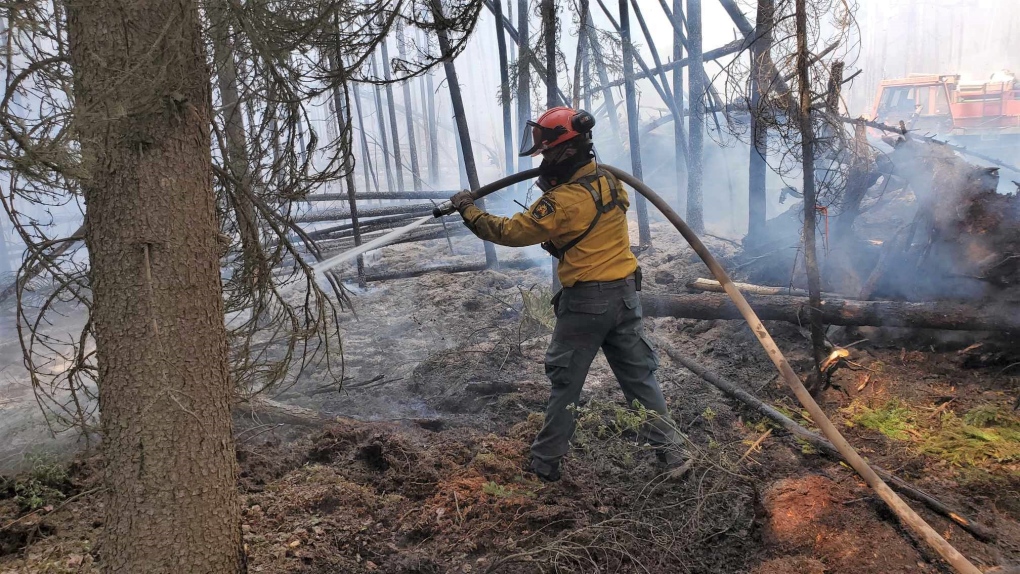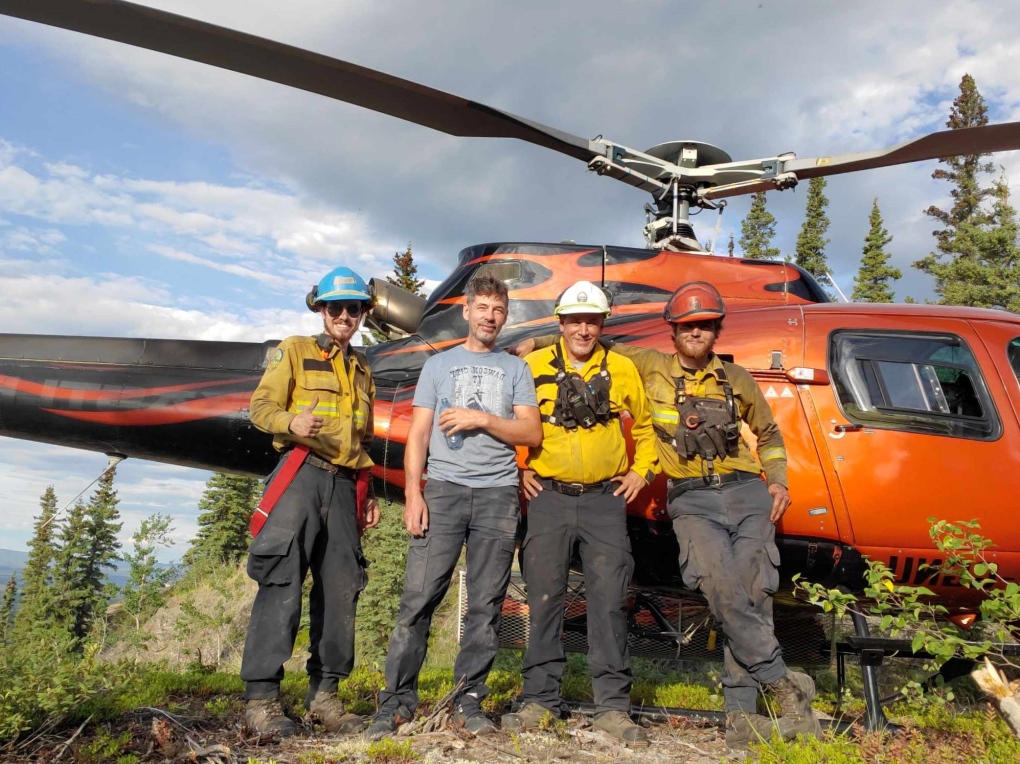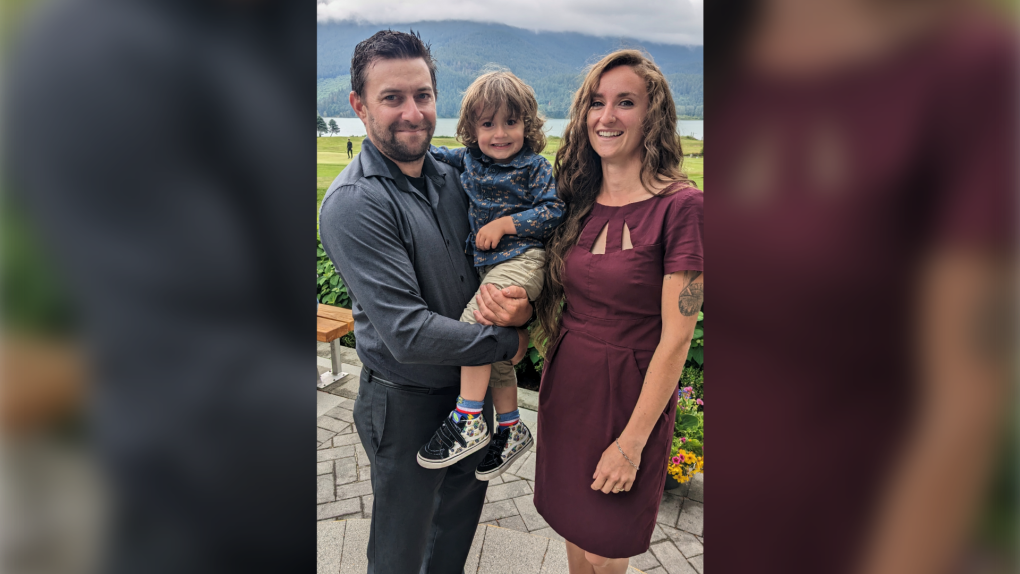
Ontario to ban use of cellphones in school classrooms starting in September
Ontario is introducing a suite of measures that will crack down on cellphone use and vaping in schools.
Fighting wildfires in Canada is not an easy job.
Firefighters often work in sweltering, dry heat and strong winds can sometimes make the task of putting out fires nearly impossible. They are the kind of people who run toward danger, want to help and have no problem working long hours.
Canada's firefighters have been tirelessly protecting cities and towns from the massive blazes across the country since early spring. This year's fire season has been unlike any other, testing the limits of fire crews who need to be physically and emotionally prepared to deal with the unpredictable nature of wildfire.
About 134,000 square kilometres of land has been burned so far this year, that's more than the combined surface area of Prince Edward Island, New Brunswick and Nova Scotia.
As of Aug. 18, more than 1,000 fires are actively burning in Canada, many of which are out of control.
This year, three firefighters have died while battling the flames, underlining how dangerous the job can be.
CTVNews.ca spoke with three firefighters currently on the front lines. For them, the job is more than what they do, it encompasses their entire life.
In the mountainous landscape and dense forest of the Yukon, 26-year-old Elijah Stevens is loving every moment of his job.
The Ojibwe firefighter from Coochiching First Nation has spent the last three fire seasons aiding communities in the territory. He works with Yukon First Nations Wildfire, a company that operates in partnership with the territorial government.
Stevens studied structural firefighting in college, when he was introduced to other opportunities.
 Elijah Stevens fighting a wildfire in Yukone. (Contributed)
Elijah Stevens fighting a wildfire in Yukone. (Contributed)
"I just absolutely love the lifestyle of being out in the bush, that's kind of what drew me into it and then as soon as I did a little bit of research, I absolutely fell in love with this denomination of work," he told CTVNews.ca in an interview.
Stevens says the job is not only fulfilling his desire to be outdoors.
"I absolutely fell in love with helping out both mother nature as well as the communities here in Yukon," Stevens told CTVNews.ca from his camp near the town of Carmacks, a two-hour drive from Whitehorse.
For Stevens — who describes himself as a little bit of an adrenaline junkie — the job is exciting, different each day and fulfills his passion of helping others, especially other Indigenous communities.
"I take high pride in being Indigenous and First Nations…Being able to offer my service to something that's not only employing Indigenous Canadians, but also doing the best that they can to serve the Bands (is rewarding)," he said.
Stevens says there are many emotions that can come from being the leader of a crew of firefighters: stress, excitement and terror. It can also be mentally and physically taxing.
His three-person crew fights fires for 19 days from May to September each year. They work for eight to 16 hours a day, and then take two days off.
While they are on active duty they sleep at previously established bases, which consist of tents, food, water and other supplies.
 Elijah Stevens and his crew. (Contributed)
Elijah Stevens and his crew. (Contributed)
Although Stevens is an avid camper and enjoys the wilderness, he says being outside can sometimes be difficult. Earlier in the fire season, his crew went to Alberta where they would spend between 12 and 18 hours on the fireline.
"Just beating up the body mentally and physically. And then you're coming back to the tent…It does require a lot and it does take a big toll on you. It's not as restorative as what it could potentially be," Stevens said.
During their stint in Alberta, Stevens and his crew had witnessed some "extreme" fire behaviour that forced them to retrace their steps.
"We're the type of people where we run into situations to help people because we understand the severity of losing your home or losing your loved ones," he said. "That service mentality of 'What can I offer?' And 'How can I help?' It kind of supersedes the fear."
Despite the sometimes difficult working conditions, he says hearing simple "thank yous" from community members makes it worth each hard day fighting fires.
"I just want to say that we really appreciate that and that keeps us coming back to work every single day," he said.
Tegan Luckham was always destined to be a firefighter, or at least that's what her brother believed.
"I sort of didn't have too much of a choice, I guess, being a firefighter," she told CTVNews.ca in an interview after a long overnight shift on the frontlines. "My older brother was on the hall and as soon as I was old enough, he said 'You're joining the hall.'"
This month will mark 13 years since Luckham became a volunteer firefighter, the backbone of many crews in the country. She first started out volunteering on Thetis Island, off Vancouver Island and eventually moved to the Chilliwack River Valley Fire Department in B.C.
 Tegan Luckham and part of her fire family. (Contributed)
Tegan Luckham and part of her fire family. (Contributed)
Volunteers from small communities comprise the majority of the people fighting wildfires across Canada. Ken McMullen, president of the Canadian Association of Fire Chiefs estimated of the 126,000 firefighters countrywide, between 80,000 and 90,000 are volunteers.
During the summer months, this means they are juggling a "job that pays the bills" and in the case of Luckham, a young family. Her flexible working hours as a barn manager and owning her own horse-riding business allows her to fight fires for week-long periods throughout the summer.
Luckham's husband is also a volunteer firefighter which can "complicate" their situation.
"We have animals and our kid (Maverick) so usually, we kind of high five, I'll go up for a week and then he'll go out for a week," she said.
At the time of Luckham's interview with CTVNews.ca, she was deployed to Seton Portage, B.C. where an out-of-control fire burned. Typically, fire crew shifts last for 12 hours and rotate day and night. When they are stationed out in the bush, they have to be self-sufficient for three days.
Luckham says firefighters who work the night shift are accommodated in a local hotel, so they can sleep during the day.
When asked why she volunteers to fight wildfires, Luckham said the job is "very cool."
"I've seen more of B.C. on deployment than I have travelling on my own," she said. "You will learn so much and you get to experience all these really cool things… It's hard work and we can have really tough bad days, but it's really fulfilling and rewarding work."
 Tegan Luckham and her family. (Contributed)
Tegan Luckham and her family. (Contributed)
Being away from home can be challenging, but Luckham's fire crew helps to support her and her family.
"Fire service is a family, you can't work with people in these sorts of conditions and not grow a bond with them in some way," she said. "You can rely on your fire family for everything, they just step up if you need help…it's pretty awesome to have that kind of support system around."
The feeling of support and giving back to her community is the main reason Brittany Evans volunteers with her local fire department.
Based in Penhold, Alta., the mother of two has been a firefighter for just over seven years. During the day she is a financial advisor which gives her some flexibility when responding to calls.
"Anytime someone calls 9-1-1 it's usually one of the worst days of their lives, and just to be able to go and help them through that, it's just a good way to give back to the community," she told CTVNews.ca.
 Brittany Evans and her family. (Contributed)
Brittany Evans and her family. (Contributed)
Usually, her department of 35 people focuses on responding to calls in the oil fields, but during wildfire season they are sometimes deployed to other parts of the province.
This year was Evans' first time going to the frontlines. During other seasons her department was tasked with protecting structures, but this year, due to the nature of the fires, it was "very different."
"The first two days it was structural protection on a lot of acreages but then I was actually sent to the frontline of the fire," she said. "It was a learning experience…it was great…but it was definitely different."
Evans was sent to the Drayton Valley, Alta. Fire, which destroyed five homes and forced the town to evacuate.
She worked a 92-hour week and said she was lucky to have a hotel to sleep in at night. During her deployment, Evans says she lost weight due to the constant walking needed to keep the fire at bay.
Working on the front lines can be "nerve-wracking," Evans says.
 Fire crews sometimes work around the clock to ensure the fire doesn't spread. (Contributed by Brittany Evans.)
Fire crews sometimes work around the clock to ensure the fire doesn't spread. (Contributed by Brittany Evans.)
"I know it's scary, I know it's dangerous and away from my family. People die doing this all the time," she said. "I think about my clients at work, my kids and my husband. I had a lot going through my mind. But at the same time…I knew that I could do it. I just needed to be smart."
Evans' says working wildfires was a learning experience for the entire department as they navigated day-to-day tasks. She adds the pride firefighters feel being entrusted with such high-risk situations and knowing they are protecting communities is all the gratitude they need.
"It gives a sense of satisfaction," Evans said.

Ontario is introducing a suite of measures that will crack down on cellphone use and vaping in schools.
The Canadian Food Inspection Agency has issued a recall for a specific chocolate brand sold in Ontario and Quebec.
Raneem, 10, lives with a neurological condition and liver disease and needs Cholbam, a medication, for a longer and healthier life.
Ontario is now home to an invasive and toxic worm species that can grow up to three feet long and can be dangerous to small animals and pets.
One person has been charged with second-degree murder in connection with the death of a man who fell from a balcony following an altercation inside a Toronto apartment building.
Dozens of people raised their arms in the fascist salute and shouted a fascist chant during ceremonies Sunday to honor Italian dictator Benito Mussolini on the 79th anniversary of his execution.
Zendaya and castmates Mike Faist and Josh O’Connor have been on a globetrotting press tour to get the word out about Italian director Luca Guadagnino's original film, which opened in 3,477 locations in the U.S. and Canada.
Quebec will invest $603 million over five years to counter the decline of French in the province, French Language Minister Jean-Francois Roberge announced Sunday.
Morgan Freeman spoke the words, but pretty much everyone who took the stage at the presentation of the AFI Life Achievement Award agreed: "Nicole Kidman. She makes movies better."

As if a 4-0 Edmonton Oilers lead in Game 1 of their playoff series with the Los Angeles Kings wasn't good enough, what was announced at Rogers Place during the next TV timeout nearly blew the roof off the downtown arena.
Mounties in Nanaimo, B.C., say two late-night revellers are lucky their allegedly drunken antics weren't reported to police after security cameras captured the men trying to steal a heavy sign from a downtown business.
A property tax bill is perplexing a small townhouse community in Fergus, Ont.
When identical twin sisters Kim and Michelle Krezonoski were invited to compete against some of the world’s most elite female runners at last week’s Boston Marathon, they were in disbelief.
The giant stone statues guarding the Lions Gate Bridge have been dressed in custom Vancouver Canucks jerseys as the NHL playoffs get underway.
A local Oilers fan is hoping to see his team cut through the postseason, so he can cut his hair.
A family from Laval, Que. is looking for answers... and their father's body. He died on vacation in Cuba and authorities sent someone else's body back to Canada.
A former educational assistant is calling attention to the rising violence in Alberta's classrooms.
The federal government says its plan to increase taxes on capital gains is aimed at wealthy Canadians to achieve “tax fairness.”